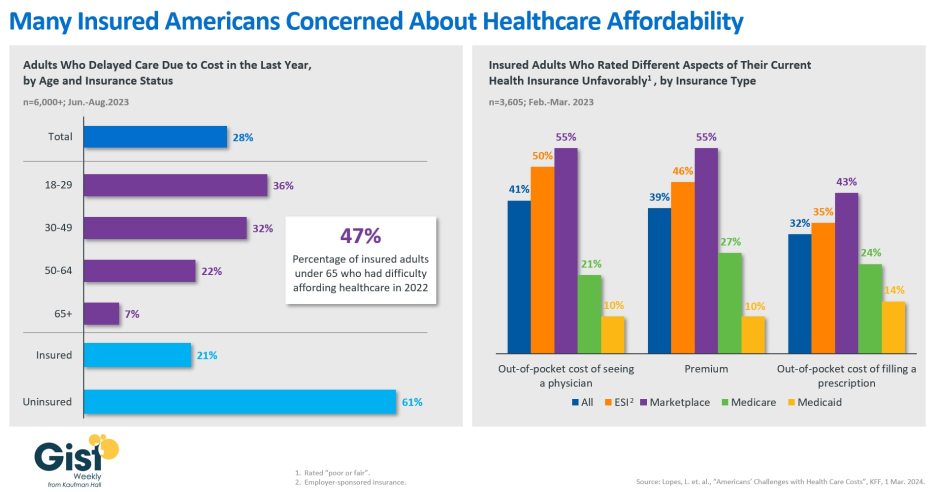From the Gist Weekly team at Kaufman Hall
We’re pleased to be back in your inboxes again, sharing what we think about some of the week’s biggest healthcare news. We’re also delighted to have so many new subscribers joining us—welcome! Please feel free to forward this email to others and encourage them to subscribe as well.
In the News
What happened in healthcare recently—and what we think about it.
- Physician practices report financial impacts of Change cyberattack. This week, the American Medical Association (AMA) shared the results of an informal survey quantifying the impact of the Change Healthcare cyberattack on physician practices. The survey, answered by more than 1,400 individuals at medical groups between March 26 and April 3, found that 77 percent of respondents have experienced service disruptions since the breach was detected on February 21 and are still feeling the effects of the attack. A similar number reported losing revenue from unpaid claims, and more than 85 percent have needed to devote additional staff and resources to revenue cycle tasks. More than half of respondents said they have had to draw from personal funds to cover practice expenses. The survey, which collected more than three quarters of its responses from practices with ten or fewer physicians, highlights the disproportionate impact of the cyberattack on smaller physician groups. 12 percent of practices reported receiving financial support from Medicare, while 25 percent reported receiving assistance from UnitedHealth Group (UHG).
- The Gist: This survey provides useful data on just how wide-reaching the negative impacts of the Change cyberattack have been on medical groups. Many smaller practices were already in an especially vulnerable state, and the combination of lost revenues and additional expenses devoted to managing the issue may be difficult for some to recover from. Even with UHG reporting that medical claims processing has been restored, the fallout from the hack will continue to be felt for months. Although providers report seeing some improvements, Change’s processing volume had not reached pre-incident levels as of late March, and Change is also still working through a $14B backlog of claims.
- Walgreens-backed VillageMD selects new president as it shutters clinics. On Wednesday, VillageMD, a primary care provider network majority-owned by Walgreens that includes Village Medical, Summit Health, and CityMD, announced that it selected Jim Murray to serve as its president and chief operating officer (COO), effective April 1. Murray, whose background includes COO roles at Centene, Magellan Health, and Humana, will oversee VillageMD as it continues to execute its downsizing strategy, part of Walgreens’ ongoing $1B cost-cutting initiative. During its fiscal 2024 second quarter earnings call late last month, Walgreens CEO Tim Wentworth—who joined the company last October—reported a significant quarterly loss that reflected a nearly $6 billion write-down in the value of its investment in VillageMD. Wentworth announced that VillageMD now plans to close 160 clinics, including the 60 that were previously targeted for closure last fall. Across the past few months, it has already announced 140 of these closures.
- The Gist: Walgreens is focused on boosting the profitability of its VillageMD provider asset, which it says has been facing many of the same challenges confronting other medical groups today, including Medicare reimbursement and provider productivity challenges as well as slower-than-expected patient panel growth. Walgreens executives say that the company remains committed to its primary care business and to its goal of being the most convenient entry point into the healthcare system. Achieving this goal will take both time and patience from its investors.
- CVS Caremark to cover over-the-counter birth control without cost-sharing. Late last month, CVS Caremark, the pharmacy benefit manager (PBM) division of CVS Health, shared that it will include Perrigo’s Opill in its preventative services oral contraceptives list, allowing many of its beneficiaries to obtain the drug at no cost. Only six states require private plans to cover over-the-counter (OTC) oral contraceptives, in contrast to prescribed contraceptives, which must be covered by federal mandate. In July, the Food and Drug Administration (FDA) granted approval for Opill to become the first oral contraceptive available over the counter. Perrigo priced a one-month supply at $19.99, and pharmacy chains began stocking the medication last month.
- The Gist: When the FDA first approved Opill for OTC use, many wondered about the implications of cost and coverage on access, but CVS Caremark’s decision may now pave the way for more widespread coverage. The Affordable Care Act’s preventative care coverage requirements were not designed for OTC medications, which leaves it up to payers and PBMs to make coverage decisions outside of the states with policies that address this gap. Though Opill is a progestin-only birth control, its FDA approval marks a significant shift in the regulatory environment around birth control and may lead to other types of birth control moving OTC in the future.
Plus—what we’ve been reading.
- The role of AI chatbots in mental healthcare. Published last month in the Guardian, this piece dives into the growing availability and use of AI-generated therapists. As the public is becoming more comfortable conversing with AI, an increasing number of people are now electing to use an AI chatbot either in tandem with, or even instead of, a human therapist. Some patients report that they have enjoyed the availability, advice, and lower costs offered by these “AI therapists.” Although chatbots have been a useful alternative for people who feel uncomfortable confiding in a human therapist due to perceived judgment, some mental health practitioners worry that an overreliance on them could “become part of a defense against human intimacy.” The author suggests that AI chatbots could potentially extend limited therapist resources while enabling some patients to receive therapy in a way they may find more comfortable. As one chatbot user put it, “it doesn’t matter if it’s a living person or a computer. I’ll get help where I can in a method that works for me.”
- The Gist: As is the case across the care delivery spectrum, AI tools are showing significant promise as a supplement, not a complete replacement, for humans. AI chatbots could help meet the skyrocketing demand for mental healthcare, which has overwhelmed the undersupplied field of behavioral health practitioners, potentially reducing care delays that can exacerbate patients’ conditions. However, integrating AI tools into mental healthcare must be handled with the utmost caution and respect, especially as AI “hallucinations” (creating nonsensical or inaccurate outputs) could lead to inappropriate answers that are detrimental to care.
Graphic of the Week
A key insight illustrated in infographic form.
Unpacking one aspect of healthcare affordability
In this week’s graphic, we showcase recent KFF survey data on how healthcare costs impact the public, particularly those with health insurance. Nearly half of US adults say it is difficult to afford healthcare, and in the last year,28 percent have skipped or postponed care due to cost, with an even greater share of younger people delaying care due to cost concerns. Although healthcare affordability has long been a problem for the uninsured, one in five adults with insurance skipped care in the past year because of cost. Insured Americans report low satisfaction with the affordability of their coverage. In addition to high premiums, out-of-pocket costs to see a physician or fill a prescription are particular sources of concern. Adults with employer-sponsored or marketplace plans are far more likely to be dissatisfied with the affordability of their coverage, compared to those with government-sponsored plans. With eight in ten American voters saying that it is “very important” for the 2024 presidential candidates to focus on the affordability of healthcare, we’ll no doubt see more attention focused on this issue as the presidential election race heats up.

On the Road
What we learned from our work in the real world. This week from Dan Majka, Managing Director, at Kaufman Hall.
Taking a fresh look at long-range financial planning
“I feel like I’m Mark Cuban on Shark Tank,” a health system CFO shared with me recently. “Our board just gave us the green light to start reinvesting in our growth strategies again, and now every day I’ve basically got a line out my door of our business line leaders pitching their big-dollar projects.” Having joined this system during the pandemic, this CFO found the renewed emphasis on long-range financial planning to be both exciting and bit overwhelming. “Obviously we know we need to deploy capital in a significant way again, but it feels like all the rules about what drives a return on investment have changed, and I’m no longer sure we have the right capital planning processes and discipline in place.”
I assured this CFO that he’s not alone, as many health systems had put disciplined long-term financial planning and capital allocation on pause while navigating the short-term implications of the pandemic’s myriad disruptions. With the industry experiencing what looks to be an improving financial outlook, now is the time to take a reinvigorated approach to integrated decision-making, including processes, analytic requirements, evaluative criteria, and the overall annual planning calendar. This may require enhanced data and more sophisticated planning resources and tools, but above all it’s most important for healthcare leaders to get started by asking the right questions about what their organization needs moving forward. I’d be happy to share examples of the new kinds of frameworks, metrics, and targets we’re currently seeing systems put in place in order to make the right investment decisions today that will create value for the organization in the future— please don’t hesitate to reach out.
On Our Podcast
Gist Healthcare Daily—All the headlines in healthcare policy, business, and more, in ten minutes or less every weekday morning.
Last Monday and Tuesday, we revisited host J. Carlisle Larsen’s conversation from last fall with Glen Tullman, CEO of employee healthcare navigation company Transcarent. In that two-part discussion, they talk more about Transcarent’s partnerships with major health systems across the country, as well as about how employer-sponsored healthcare coverage may change in the future.
This week you may have heard a new voice sharing the day’s biggest healthcare news stories. That’s because we proudly welcomed Stephanie Wolf to the show. She’s an award-winning, Denver-based journalist who has spent more than a decade working as a reporter and producer with NPR member stations in Colorado and Kentucky. Stephanie will be taking the helm of Gist Healthcare Daily while JC is out on leave until mid-August.
Be sure to tune in every weekday morning and subscribe on Apple, Spotify, Google, or wherever fine podcasts are available.
Thanks for taking the time to read another week’s news and analysis. We’ll see you back here next Friday! In the meantime, if you’d like to peruse past editions of the Gist Weekly, please visit our archive.
Best regards,
The Gist Weekly team at Kaufman Hall






